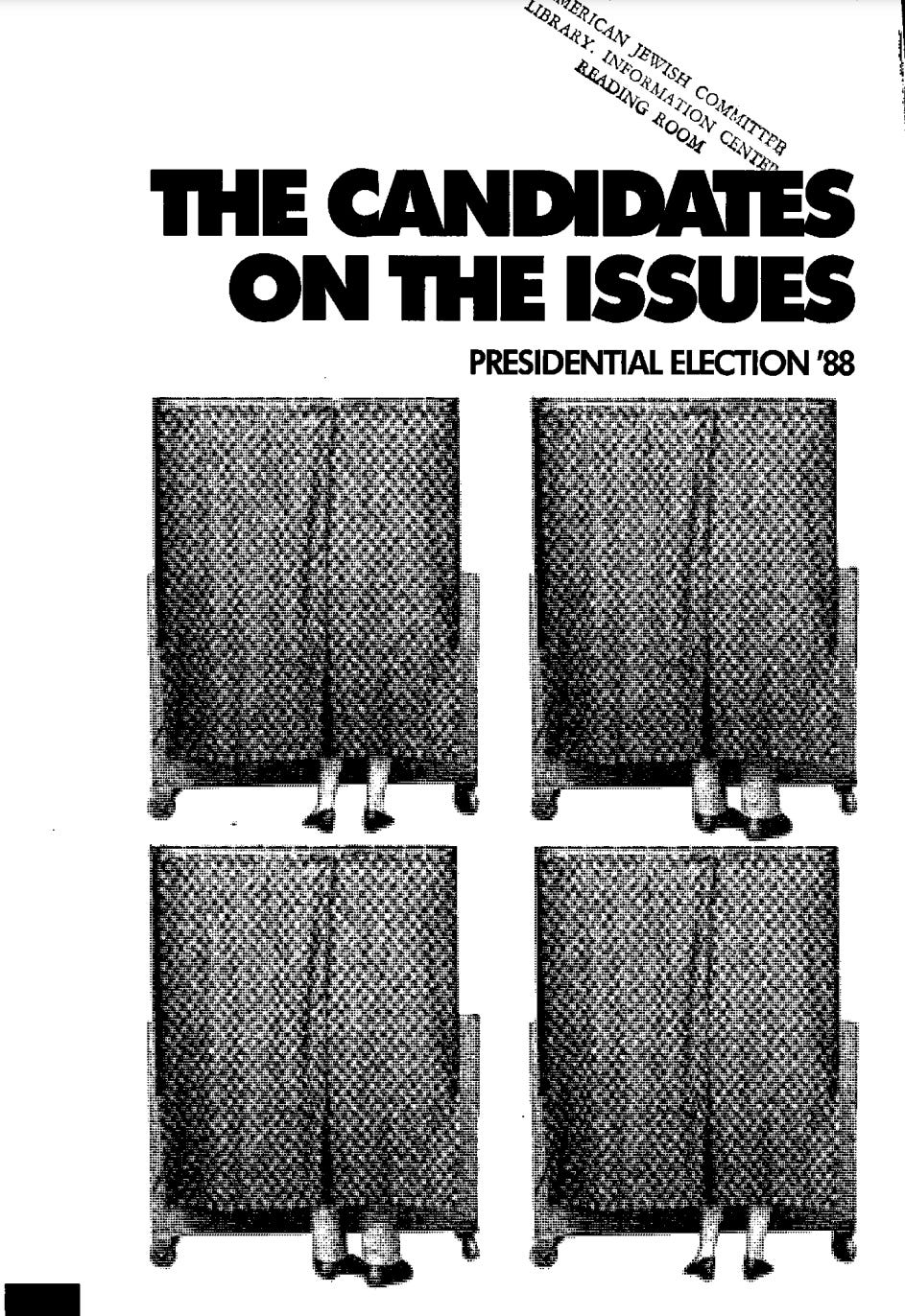Hello and Welcome to the August edition of the Documench Newsletter.
Summer is nearly over, the Israel-Gaza War continues, as does the fraught discourse surrounding Jews and protest on college campuses across the country. Students are returning to changed campuses: Columbia University’s president resigned, a judge ensured Jewish access at UCLA, Jewish college students are getting self defense training, and schools across the country are trying to forestall the encampments and conflicts that marked the last school year. We’re also in an election year where there’s about a 50/50 chance America will have its first female president and a first first gentlemen who also happens to be Jewish.
This month we interview rabbi, writer, and thinker Andy Bachman who found himself in the midst of a big controversy last week after his Zionism caused a book release event to be canceled at a Brooklyn bookstore. We also mark the Presidential Election’s final months with a look at some of our holdings focused on Jews and American presidential politics.
As always, reach out with feedback, suggestions of articles we should consider sharing, or ideas for documents we should consider archiving. We can be reached at bermanarchive@stanford.edu.
Thanks for reading,
-Ari
Ari Y Kelman, Director, Berman Archive
Zionism—Beyond Good and Evil
Last week, author Joshua Leifer was supposed to celebrate the launch of his first book, Tablets Shattered: The End of an American Jewish Century and the Future Of Jewish Life, with a Q & A at Powerhouse Arena bookstore in Brooklyn, NY. The event was abruptly canceled when a Powerhouse employee learned that Leifer’s interlocutor, Andy Bachman, was a Zionist. Outrage, recriminations, a lost job, thought pieces, and an eventually rescheduled Q&A to a much bigger crowd ensued. We know Bachman as a revered rabbi, a writer, and a sophisticated and nuanced thinker when it comes to issues of Jewish Identity. We were eager to hear more about his experience being canceled, the current moment, and the nuances of his Zionist POV and he was kind enough to participate in an interview.
How are you feeling in the wake of the Powerhouse Books event cancellation?
In cases like the canceled book event, I get energized. Whether it’s my DNA or my commitment to education, I don’t mind an argument. And fundamentally, I viewed the cancellation as an opportunity for an argument and to recreate the book talk, as we did, in a larger format, with more people, that could model for us what civil discourse can and ought to be.
What did you think you were going there to talk about?
Well, I first met Josh in 2011 when he was a Bronfman Fellow. This unique learning experience in American Jewish life has always valued respectful engagement with difference of opinion, practice and outlook. Josh was a wonderfully brilliant and argumentative 17 year old that summer in Jerusalem, so I was very much looking forward to picking up our conversation. I have followed Josh’s journalism career and was then so impressed with his historical writing which comes through so clearly and cogently in the book. What was cut off at Power House we simply picked up at the Center for New Jewish Culture and instead of it being in front of 25 people at the bookstore it was in front of 400 people in a shul. A win!
Have the present political circumstances changed how you approach conversations like the one you were supposed to have the other night?
Great question. No and yes. I think I have always been committed to civil discourse and count myself among the many Americans these days who are so tired and exasperated by the negativity and the vituperations of our current political discourse. But since the Gaza War, that kind of engagement has become increasingly difficult. So, yes, I think I remind myself more than I used to about the importance of waiting and listening and thinking before responding to ideas that another person is sharing. Fortunately, Josh is a very thoughtful young scholar and truth be told it was a joy to watch him formulate his thoughts as they tumbled forth from his brain. One more thing: both of us, Josh more on the Left and me more in the Center but still identified with liberal ideas, have been on the receiving end of some very hateful rhetoric—sometimes from the pro-Palestinian protestors and sometimes from Jews on the Right. It’s awful to experience. But I often remind myself in these situations that the noise of the extremes cannot and should not cancel out the reasoned thinking of the majority of people. I try to approach my conversations these days with that in mind.
What does the Powerhouse Books event tell you about the issues facing American Jews today? Does it change your reading of Tablets Shattered?
Not really, to be honest. The owner of the bookstore has responded pretty honorably. He recognized that he wasn’t fully paying attention to an issue that was festering and it ended up embarrassing him publicly. Maybe it was a blessing in disguise—a kind of extreme response that is symptomatic of a deeper ailment in the body politic. In such divided times it is precisely “the book” that we need, to slow down our thinking, to talk through the ideas written there, and to risk having one’s mind if not changed than expanded. I hope it doesn’t sound too pollyannaish but I guess I’m a silver linings guy.
In light of what happened, what is one thing you would like the Powerhouse Books staff to read and discuss (an article, a book, a historic document)?
Two books, in homage to my teacher George Mosse: Arthur Hertzberg’s The Zionist Idea and Paul Mendes-Flohr and Jehuda Reinharz’s The Jew in the Modern World. That way they would get both excellent historical analysis along with the study of historic documents. As far as I know there are neither Cliff’s Notes nor AI versions of either so there would be no escaping dealing with these foundational texts. Revenge, they say, is best served cold.
In much of the coverage of the event, including Josh Leifer’s article in the Atlantic, we noticed that people were careful to identify you as a “progressive Zionist” or a “liberal Zionist.” While this may be an accurate description of your politics, I wonder about its appearance in these stories, as if you being a “progressive Zionist” might work as some kind of political stamp of approval (in distinction to some other kind of Zionist, who would not be acceptable). If we’re reading that right (to paraphrase Glenda the Good Witch “There are good Zionists and Bad Zionists, and Andy is a good zionist.”), how does that change the equation or the meaning of the Bookstore’s response to the event? Was it more about what kind of Zionist you are than it was about your being a Zionist at all?
You have read my mind with this question. I’m willing to say the following about my affiliations: I am a Jew. I am a Zionist. I am an American. I am a Democrat. How I engage with those identities, represent them, or react to others who share those identities is never formulaic and hopefully, always interesting. I once gave a sermon to my large Reform congregation that was appreciated by some and troubling to others, namely, that Freud and Herzl had a far greater impact on the formation of Jewish identity in America than any denominational rabbi. The movements of American Judaism served a purpose for a time but they are now functionally obsolete. There are more Jews who see a therapist or live in Israel and speak Hebrew than there are denominational Jews who observe Judaism. So, you know, let’s update our definitions and labels and live genuinely, not according to platforms or brands. I’ll also share a story from the war. A young person I know who was active in the Jews for a ceasefire movement posted to their Instagram at Hanukah time a photograph of Vitka Kovner, a resistor in the Vilna ghetto with the line, “This is what resistance looks like.” I wrote to this person asking if they knew what that was. They did not. And when prompted to do research on both Vitka and her partner Abba Kovner, we were productively engaged in a profound discussion about heroism, resistance, wars in Europe and wars in Israel between the nascent state of Israel and the Arab armies. “This course,” George Mosse famously said, “is designed to rid you of your slogans.” Amen to that.
Jews, Presidential Politics, and the Archive
In so many ways this year’s presidential election is unprecedented. Somehow, Jews continue to be part of the conversation. To widen the aperture a bit we found some items in the Berman Archive that show how Jews have been engaged in Presidential politics in the past.
There’s this 1960 American Jewish Yearbook entry on religion and presidential politics, a year when the electorate overcame its longstanding anti-Catholic bent to elect John F Kennedy.
In 1988, the American Jewish Committee produced The Candidates on the Issues: Presidential Election 1988, a survey of the main candidates of their views on Israel, the Middle East, and other areas of concern for American Jews. Spoiler alert: a lot of the talking points haven’t changed much in the intervening 36 years. Sh’ma also produced a special election issue in 1988, where different voices offered their take, through a Jewish lens. Come for the Dukakis stories and stay for the Jewish consternation about Jesse Jackson’s candidacy and perceived apathy towards the concerns of Jews.
Writing in Sh’ma in 2012, Jonathan Sarna analyzes the Jewish vote in presidential elections throughout US history: “Focusing on presidential elections since 1980, it appears that about 30 percent of Jewish voters may be characterized as swing voters, swayed by general as well as Jewish issues, particularly the economy, Israel, and church-state issues.”
We’ll, of course, be tracking analyses, discourse, and documents of the American Jewish electorate in 2024—and as long as we still hold elections in this country.


